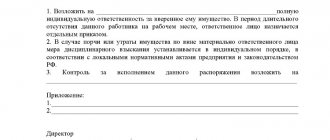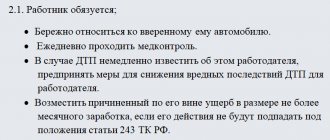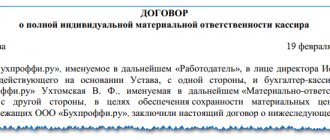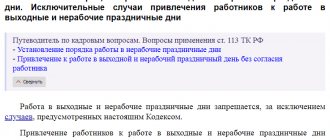The full financial liability of an employee to the employer is one of the forms of liability that imposes on the employee the obligation to compensate for the damage he caused to the enterprise. To whom it is applicable and when it is used – that’s what we’ll talk about today.
- Material and full financial responsibility
- To whom can it be applied?
- In what cases does full financial responsibility occur?
- Positions and works
- Features of concluding a contract
- Procedure for bringing to responsibility
Material and full financial responsibility
At any enterprise, a situation may arise when an employee causes damage to the property with which he works. For example, this may occur due to improper operation, failure to comply with safety precautions, or for reasons beyond a person’s control.
Labor legislation, namely Art. 238 of the Labor Code of the Russian Federation establishes that the employee must compensate for the damage caused to the employer. However, this does not apply to lost profits - its amount cannot be recovered from employees. If we are talking about very real damage, then the amount of recovery is calculated based on the damage caused. This rule is valid if, as a result of the employee’s actions:
- the property of the enterprise was damaged;
- the property has become less valuable (for example, there is some kind of breakdown);
- it was necessary to restore the property to bring it to its previous condition;
- third parties incurred losses and are now demanding compensation.
Even if an employee caused damage to the company, we are usually talking about limited financial liability. The amount of recovery in this case is set in the amount of average monthly earnings on the basis of Art. 241 Labor Code of the Russian Federation . However, sometimes we can talk about compensation for damage in full, regardless of whether it exceeds a monthly salary or not. Then it is said that the employee bears full financial responsibility (PMR). But it doesn’t apply to everyone and not always.
The concept of PMO is enshrined in Art. 243 Labor Code of the Russian Federation . It implies that the employee must compensate the employer for direct actual damages in the amount of 100%.
NTVP "Kedr - Consultant"
LLC "NTVP "Kedr - Consultant" » Services » Legal consultations » Labor disputes » On concluding an agreement on financial liability with persons whose positions are not included in the list of positions and works replaced or performed by employees with whom the employer can enter into written agreements on full financial liability
Questions:
Can an employer (educational organization, university) enter into agreements on individual or collective (team) financial liability with persons (employees) whose positions are not included in the list of positions and works replaced or performed by employees with whom the employer can enter into written agreements on full individual or collective (team) financial responsibility for the shortage of entrusted property (Resolution of the Ministry of Labor of the Russian Federation of December 31, 2002 No. 85), securing (prescribing) this type of responsibility in the employment contract and job description.
What are the legal consequences of such recognition for the employer?
What sanctions can the labor inspectorate apply to an employer?)
Lawyer's answer
According to Part 1 of Art. 244 of the Labor Code of the Russian Federation, an agreement can be concluded with an employee on full individual financial liability for the shortage of property entrusted to employees who directly serve or use cash, commodity values or other property. The purpose of concluding such an agreement is to compensate the employer for probable damage in full. The absence of this agreement does not allow the employer to hold the employee to full financial liability. To bring an employee to full financial liability in accordance with Art. 244 of the Labor Code of the Russian Federation, the following conditions must be present:
— the employee reaches the age of 18 years (Part 1 of Article 244 of the Labor Code of the Russian Federation);
- performance by an employee of functions that are related to the servicing of monetary and commodity valuables, in a position provided for in the List of Positions and Works replaced or performed by employees with whom the employer can enter into written agreements on full individual financial responsibility for the shortage of entrusted property (approved by the Resolution of the Ministry of Labor of Russia dated December 31, 2002 N 85).
— conclusion of an agreement on full individual financial liability. The conclusion of such an agreement is the employer’s right, not an obligation. Failure to conclude such contracts with employees means releasing the latter from the obligation to bear full financial responsibility;
- the employee commits guilty and illegal actions when servicing the valuables entrusted to him;
- causal relationship.
Guide to HR issues. Material liability of the employee {ConsultantPlus}
The standard form of an agreement on full individual financial responsibility is provided for by Resolution of the Ministry of Labor of Russia dated December 31, 2002 N 85. Accordingly, the employer does not need to develop it independently. However, he may include additional conditions or individual responsibilities for the employee in the standard form or use his own form of contract. There is no need to issue an organization order.
Guide to HR issues. Material liability of the employee {ConsultantPlus}
Who can be the financially responsible person?
An employer may enter into individual agreements on full financial liability only with employees of certain categories. The list of positions and work replaced or performed by employees with whom the employer can enter into written agreements on full individual financial liability for shortages of entrusted property (hereinafter referred to as the List) was approved by Resolution of the Ministry of Labor of Russia dated December 31, 2002 N 85.
The list consists of two sections. The first contains positions that provide for the conclusion of individual contracts on full financial responsibility with the employees replacing them. In particular, these are cashiers, controllers, cashier-controllers (including senior ones), as well as other employees performing the duties of cashiers (controllers). The second section lists types of work, the performance of which also allows the employer to conclude individual agreements with employees on full financial responsibility. These, in particular, include the following works: acceptance and payment of all types of payments; for settlements during the sale (sale) of goods, products and services (including not through a cash register, through a cash register, without a cash register through a seller, through a waiter or other person responsible for making payments); servicing vending and cash machines; for the production and storage of all types of tickets, coupons, subscriptions (including subscriptions and food vouchers) and other signs (documents) intended for payments for services.
Important! The employer does not have the right to enter into written agreements on financial liability if the employee’s position or the specific work entrusted to him is not provided for by the specified List (Article 244 of the Labor Code of the Russian Federation, letter of Rostrud dated October 19, 2006 N 1746-6-1).
If the employer has not complied with the requirements of the law on the procedure and conditions for concluding and executing an agreement on full individual financial liability, then this may serve as a basis for releasing the employee from the obligation to compensate for damage caused through his fault in full in excess of his average monthly earnings (Review of court review practice cases on the financial liability of an employee (approved by the Presidium of the Supreme Court of the Russian Federation on December 5, 2018)).
Guide to HR issues. Material liability of the employee {ConsultantPlus}
On the issue of unlawful conclusion of an agreement on the financial liability of an employee, administrative liability is provided for:
- according to Part 4, 5 Art. 5.27 of the Code of Administrative Offenses of the Russian Federation - if, for example, you incorrectly drew up an employment contract with an employee;
- according to Parts 1, 2 Art. 5.27 of the Code of Administrative Offenses of the Russian Federation - for any other violations related to the incorrect assignment of duties to the employee;
Ready-made solution: How to assign cashier duties to an employee (ConsultantPlus, 2019) {ConsultantPlus}
An employer can enter into agreements with employees on collective (team) financial liability (Article 244 of the Labor Code of the Russian Federation). Such contracts are concluded when it is impossible to differentiate the responsibility of each employee for causing harm (Part 1 of Article 245 of the Labor Code of the Russian Federation).
These contracts can be concluded only with those employees who perform work included in the List (approved by Resolution of the Ministry of Labor of Russia dated December 31, 2002 N 85). In particular, such work is: acceptance and payment of all types of payments; settlements for the sale (sale) of goods, products and services (including not through a cash register, through a cash register, without a cash register through a seller, through a waiter or other person responsible for making payments); servicing vending and cash machines; for the production and storage of all types of tickets, coupons, subscriptions (including subscriptions and food vouchers) and other signs (documents) intended for payments for services.
Such an agreement can be concluded, for example, with a team of warehouse workers, since they perform the work provided for in the specified List, namely: acceptance for storage, processing (manufacturing), storage, accounting, release (issuance) of material assets in warehouses, bases, storerooms (points, departments), at sites, in other organizations and divisions; on equipment of passenger ships, carriages and aircraft; for servicing the residential sector of hotels (campsites, motels, etc.).
Guide to HR issues. Material liability of the employee {ConsultantPlus}
Order of the USSR Ministry of Trade dated August 19, 1982 N 169 approved the Instructions on the procedure for applying in state trade the legislation regulating the financial liability of workers and employees for damage caused to an enterprise, institution, or organization (hereinafter referred to as the Instructions). According to clause 3.7 of the Guidelines, agreements on full collective (team) responsibility cannot be concluded with the following persons:
— with employees of the small retail network (delivery and distribution trade, trade in tents, kiosks, etc., including those located separately in the sales area), as well as other persons with whom an individual agreement on full financial responsibility has been concluded;
- persons hired on a part-time or part-time basis, if they, together with other employees, do not manage commodity assets (these persons can be sent to independent areas of work with full individual financial responsibility);
— workers of auxiliary professions (ironers, cutters, etc.);
— junior service personnel, loaders, auxiliary (transport) workers, watchmen;
- persons under 18 years of age;
— trainees of educational institutions, students studying directly at trade enterprises;
- graduates of higher and secondary specialized educational institutions and vocational education institutions who do not have experience working with material assets, as well as persons who have undergone on-the-job training during the first year of work. These employees are prohibited from entrusting independent work on servicing material assets outside the enterprise (delivery and distribution trade, trade in tents, stalls, etc.).
The guidelines continue to apply to this day, but the order in which they will be applied has not been determined. In this regard, this document can be used as a recommendation, since the mandatory nature of its norms is not established by the Labor Code of the Russian Federation or other federal laws.
However, this regulatory act contains important clarifications that are not reflected in the current legislation. So, for example, according to clause 2.6 of the Instructions, the financial responsibility of the team for valuables located on the sales floor (in production) and in the utility room can be established if:
— the utility room is used by only one team, all its members have free access to material assets located both in the sales area and in the utility room, and participate in all trade, warehouse and production operations;
— all commodity operations of production, auxiliary warehouse premises, commodity-money transactions of the trading floor constitute a single process of the team’s work and are controlled by all its members.
The employer can use these provisions when organizing the safety of property entrusted to the team (team).
When drawing up an agreement on collective (team) financial liability, it is necessary to comply with the requirements of the law on the procedure and conditions for its conclusion. Otherwise, the employee may be released from the obligation to compensate for the damage caused through his fault in full in excess of his average monthly earnings (Review of the practice of court consideration of cases on the financial liability of an employee, approved by the Presidium of the Supreme Court of the Russian Federation on December 5, 2018).
Guide to HR issues. Material liability of the employee {ConsultantPlus}
A practical situation. Is it possible to simultaneously conclude an individual and collective agreement with an employee on full financial responsibility?
In accordance with Part 1 of Art. 245 of the Labor Code of the Russian Federation, when employees perform certain types of work together, collective (team) financial liability can be introduced in the case when it is impossible to differentiate the responsibility of each employee for causing damage and to conclude an agreement with him on compensation for damage in full. Consequently, the signing of agreements on collective and individual responsibility by one employee will contradict Art. 245 Labor Code of the Russian Federation. However, there may be exceptions. This applies to an employee who performs functions that allow him to conclude both an individual agreement on full financial responsibility and a collective one. For example, two agreements on liability can be concluded with a cashier-salesperson, since it is possible to differentiate responsibilities by type of work performed. As with the seller, an agreement on collective financial liability can be concluded with him, since in addition to the seller, other employees have access to the hall where the goods are displayed and his responsibility cannot be differentiated from them. At the same time, the duties of this employee include transactions with funds, to which no one except him is allowed.
Guide to HR issues. Material liability of the employee {ConsultantPlus}
Thus, the employer does not have the right to enter into written agreements on financial liability if the employee’s position or the specific work entrusted to him is not provided for in the specified List. If employees actually perform the work specified in Section II of Appendix No. 1 to Resolution of the Ministry of Labor of the Russian Federation of December 31, 2002 No. 85, then the employer has the right to enter into agreements with them on full financial liability.
Selection of documents (see appendix):
Question: ...Does the employer have the right to enter into agreements on full individual financial liability with employees who, in accordance with job descriptions, receive, record, store, and issue inventory materials, if the names of their positions are not indicated in the List, approved. Resolution of the Ministry of Labor of Russia dated December 31, 2002 N 85? (“Website “Onlineinspection.RF”, 2019) {ConsultantPlus}
Question: ...Employees actually carry out the work of receiving for storage, storage, accounting, release (issuance) of material assets. Does the employer have the right to include in employees’ employment contracts the obligation to ensure the safety of inventory items and to conclude agreements with them on full individual financial responsibility? (“Website “Onlineinspection.RF”, 2019) {ConsultantPlus}
The explanation was given by Igor Borisovich Makshakov, legal consultant of LLC NTVP Kedr-Consultant, November 2019.
When preparing the answer, SPS ConsultantPlus was used
To whom can the PMO be applied?
It is not always possible for the head of an organization to impose full financial responsibility on an employee. According to Rostrud Letter No. 1746-6-1 dated October 19, 2006, this is prohibited if a person does not meet the following conditions:
- is an adult;
- has job responsibilities that are directly related to commodity or monetary values;
- the position or work performed is included in a special list established by Resolution of the Ministry of Labor No. 85 of December 31, 2002.
That is, if a teenager under 18 years of age gets a job, then the PMO cannot be applied to him under any circumstances. The same applies to the situation when an employee does not work with money or goods, for example, provides consulting services. However, there are situations in which PMOs are still used.
In Art. 242 of the Labor Code of the Russian Federation provides cases when a minor can still be brought to PMO. This is possible if the damage was caused intentionally, while under the influence of drugs or alcohol, or as a result of an administrative offense or other crime.
Cases when PMO is used
An employer or employee does not always know in which cases the employee’s full financial liability arises. Their list is given in Art. 243 Labor Code of the Russian Federation. Additionally, compensation for PMO is mentioned in Part 1 of Art. 277 Labor Code of the Russian Federation. According to it, the employer is also obliged to compensate for direct actual damage that he caused to the enterprise. Based on the employment contract, full financial responsibility can also be assigned to the deputy managers and chief accountant of the enterprise.
In relation to other employees, PMO may be applied when damage was caused:
- intentionally;
- due to the criminal actions of the employee (but his guilt must be proven in court);
- under the influence of alcohol or drugs;
- due to administrative offenses (they must also be established);
- due to disclosure by an employee of secret information;
- not while the employee is performing his job functions;
- due to damage/loss of valuables that were entrusted to the employee (transferred to him for a while or entrusted to him for the entire duration of his service - such a shortage is usually discovered during the inventory).
A separate group includes cases where full financial responsibility is imposed on an employee due to labor legislation or other regulations.
Full financial responsibility: list of positions
It is permissible to impose full financial responsibility on the staff if this is provided for by the law on the financial responsibility of the employee - the Labor Code of the Russian Federation, federal laws, Resolution No. 85 of the Ministry of Labor and Social Development of the Russian Federation of December 31, 2002. The latter contains a list of jobs and positions, on the basis of which the employer has the right to enter into agreements on the personal financial responsibility of the employee. Among those with whom such agreements are concluded are managers, accountants, cashiers, collectors, forwarders, storekeepers and other workers whose activities involve the storage or transportation of money and valuables.
Positions and works
The PMO applies to all employees in exceptional cases. However, there are positions in which a person always bears full financial responsibility, even if the damage is caused to the enterprise unintentionally and without any other aggravating circumstances, simply during the normal course of duty. Resolution of the Ministry of Labor No. 85 contains a list of positions, as well as work, during which PMO may be applied to an employee (that is, the head of the organization has the right to conclude an agreement on PMO with him). Positions include:
- the director of the enterprise and his deputies;
- Chief Accountant;
- cashiers, controllers, as well as employees performing their duties;
- employees working directly with banknotes, precious metals and other currency values (providing depository services, servicing ATMs, transporting valuables, etc.);
- managers, administrators, sellers, commodity experts working in the fields of trade, catering, hotels, consumer services;
- heads of departments involved in construction and installation work;
- managers of warehouses, pawnshops, storage rooms and other enterprises involved in the procurement, transportation, storage, accounting and issuance of material assets (this also includes commandants, storekeepers and other employees);
- managers of pharmacy points, as well as pharmacists, pharmacists, and technologists working in them;
- laboratory assistants, methodologists at departments, heads of libraries.
The list of works is even more extensive. This, for example, includes work on making payments and accepting payments. In general, they all relate to work that comes into contact with material assets. To a greater extent, responsibility falls on employees of trade enterprises.
Defects in the liability agreement
Another case of refusal to recover damages is the defects of the concluded agreement on financial liability with the employee (Determination of the Armed Forces of the Russian Federation dated August 20, 2018 No. 5-KG18-161).
For example, the employer did not comply with the standard form of an agreement on collective liability. Thus, in the List of positions and work replaced or performed by employees with whom the employer can enter into written agreements on full individual or collective (team) financial responsibility, as well as standard forms of agreements on full financial responsibility, approved. Resolution of the Ministry of Labor of the Russian Federation dated December 31, 2002 No. 85 specifies the following works: purchase (reception), sale (trade, release, sale) of services, goods (products), preparation of them for sale (trade, release, sale).
In addition, the agreement on financial liability with employees did not define the procedure for:
- reception, storage and transfer of entrusted property;
- identifying damage (for example, through inventory);
- determining the degree of guilt of each employee and the distribution of responsibility in the team;
- repayment of obligations for shortage or damage to property.
But, if the employer complies with all formalities and the employees do not dispute guilt, the employer’s demands for damages are satisfied in full (decision of the Tuapse City Court dated February 27, 2018 No. 2-126/2018).
Procedure for involvement in PMO
Before demanding that an employee compensate for damage caused to the company, the employer must:
- Understand under what circumstances and why losses occurred.
- Establish the amount of damage caused. Its size is determined based on the market value of valuables or other property on the date the damage occurred.
- Receive a written explanation from the employee as to why he committed actions that resulted in losses for the company. If the employee refuses to give an explanation, this fact must be reflected in a special act.
If the amount of damage caused does not exceed the amount of monthly earnings, then the employer can make an appropriate recovery by issuing an order. But he can do this no later than 1 month after calculating the amount of damage caused.
Going to court for collection becomes mandatory in the following cases:
- if 1 month has passed since the amount of damage was determined;
- when an employee refuses to compensate the employer for losses;
- if the amount of damage is higher than the employee’s average monthly earnings.
By the way, the employee himself can go to court if he does not agree with the employer’s decision that he is guilty of actions that caused damage. The reasons may also be related to the incorrect execution of all documents for compensation of losses under PMO (for example, their fraud).







